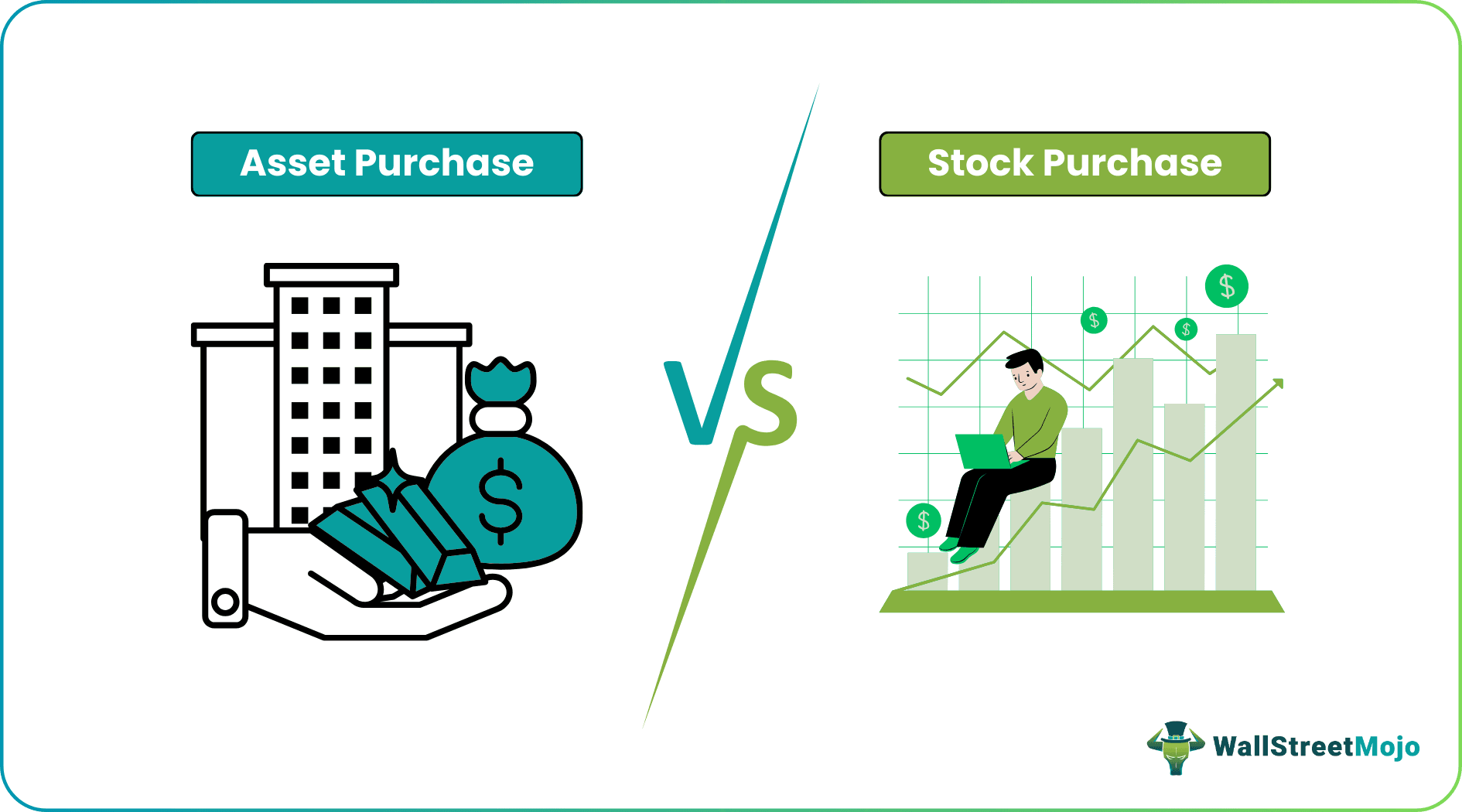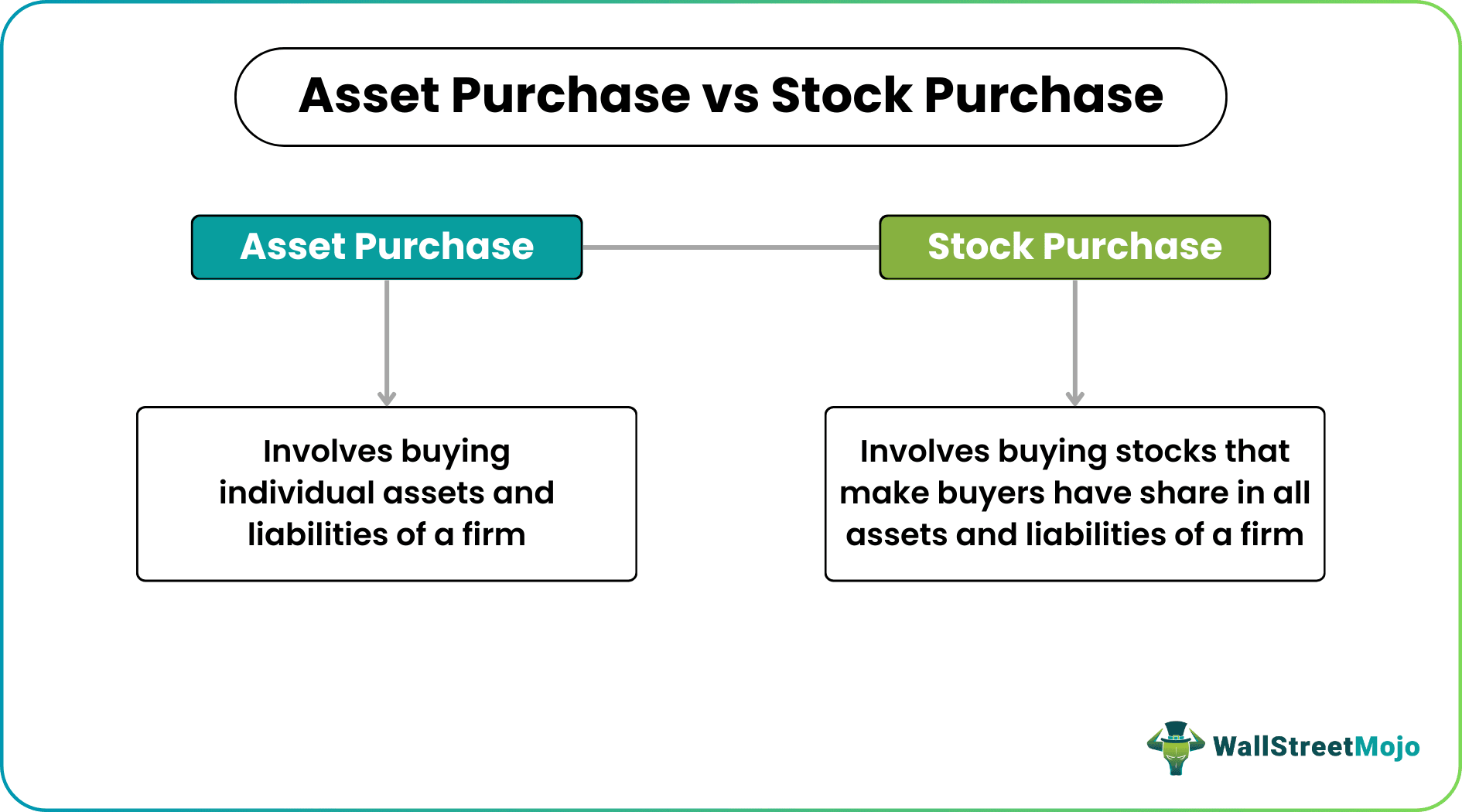Table Of Contents
Difference Between Asset Purchase and Stock Purchase
An asset purchase is where buyers purchase the specific assets and the specific liabilities of a company. Here, there is no transfer of the business ownership. On the contrary, a stock purchase is where buyers purchase a company’s stock and gain their share in the assets and the liabilities of the seller company. Here, full transfer of ownership occurs.

In a merger and acquisition transaction, the owner and investors choose whether to do the company’s asset or stock purchase transaction. The buyer of the asset – the acquirer – and the seller of the asset – the target- can have their reasons and explanations to opt for either one type of transaction or another.
- The basic difference between an asset purchase and a stock purchase is that in the event of asset purchases, the buyer acquires the desired organization's precise assets and liabilities.
- While in the case of stock transactions, the buyer must take on all the obligations and assets of the seller company, there is no transfer of ownership of the business.
- There are certain advantages of stock purchase, such as by purchasing through the stock purchase method, you can avoid paying for asset revaluations and other business-related expenses.
- Through the asset purchase method, the buyer might designate the liabilities they are willing to take on when buying an asset, leaving the other shortcomings behind.
Asset Purchase Vs Stock Purchase: Comparative Table
| Asset Purchase Method | Stock Purchase Method |
|---|---|
| No transfer of ownership of the business | Full transfer of ownership of the business |
| Businesses can claim tax benefits under this method | Businesses cannot claim tax benefits under this method |
| Less complexity method, as companies do not have to comply with the securities law business | A more complex method, as regulatory compliance is mandatory when buying a company |
| Employee agreements may need re-negotiation | Employee agreement need not be re-negotiated |
| The buyer has the right to choose the risks and the liabilities that he is ready to bear | Under this, the buyer needs to absorb all the risks and liabilities of the business. |
| The ownership under this method is not lost and does not exchange hands. | Under this method, the ownership is lost and exchanged hands. |
| Less prevalent in the market | More prevalent in the market |
What Is Asset Purchase?
The asset purchase transaction is where the buyer purchases individual company assets like goodwill, equipment inventory, etc. The firms appoint valuation experts who evaluate the assets. However, in this method, the parties can discuss which assets to acquire and which liabilities to assume, making the method more structured and complicated as more over-the-counter negotiations occur. Sometimes, the deal still remains active as the parties don’t give mutual consent.
What Is Stock Purchase?
The stock purchase is mainly related to acquiring the company’s stocks wherein the buyer becomes the company’s owner. In this purchase method, the company purchases the common stock of the target company and hence enjoys voting rights and ownership of the business.
Asset Purchase Vs Stock Purchase: Features
Whether an investor should opt for an asset purchase transaction or stock acquisition method depends on the company’s goals and objectives as well as its current status. For example, if the company has more liabilities than valuable assets, it is better to pursue a stock acquisition rather than an asset purchase.

However, if the company has more liabilities, but the assets that the company has on its balance sheet are valuable for the buyer, it is advisable to go for an asset purchase. This is because it will reap benefits in the long run for the company. Some of the differences between the two, depending on their features include:
- Under the asset purchase transaction, there is no transfer of business ownership to the buyer, and the seller remains in full ownership. In contrast, the company’s ownership transfers to the buyer in a stock purchase method.
- In an asset purchase transaction, the buyer can choose the liabilities he is willing to bear in his balance sheet. But in the case of a stock purchase transaction, the buyer must observe every business liability in its balance sheet.
- Under asset purchase, a company or business can amortize its goodwill over five years. Hence, the company can reap tax benefits by using the stock purchase method.
- The buyer can select the asset method for employees' needs without impacting their unemployment rates.
- The main advantage of asset purchase overstock purchase is that the buyer can obtain a tax deduction for depreciation and amortization over the purchased assets.
Asset Purchase vs. Stock Purchase Infographics

Asset Purchase Vs Stock Purchase: Advantages
Businesses and investors seek professional advice from investment bankers or valuation experts. They help them know numerous alternatives for companies looking for inorganic growth in their industry or even entering into a new industry altogether. Mergers and acquisition, which also refer to inorganic growth, are the buying and selling of companies with their advantages. Companies look for inorganic growth to expand their operations and reap benefits. The advantages of these two processes make decision-making easier for interested buyers. Let us have a look at some of them:
Asset Purchase
- Buying under the stock purchase method saves the cost of revaluations of assets and other things associated with the business.
- When people purchase an asset, the buyer clarifies the problems presented by minority shareholders refusing to sell their shares.
- In an asset purchase, the buyer can specify the liabilities they are willing to assume while leaving behind the other weaknesses. On the other hand, the buyer purchases stock in a company with unfamiliar or uncertain liabilities in a stock purchase.
Stock Purchase
- Buying under the stock purchase method saves the cost of revaluations of assets and other things associated with the business.
- The buyer may also be able to avoid any liability for tax transfers.
- Stock Purchase is more preferred than asset acquisition and is less complex when compared to an asset purchase.
Frequently Asked Questions (FAQs)
Yes, because through this, they can avoid inheriting potential liability that they would inherit through a stock sale.
Goodwill is not recognized in an asset acquisition. Even if there is economic goodwill in the transaction, this amount is allocated to the assets acquired based on their relative fair values.
In an asset purchase, the buyer and the seller divide the purchase price among the various assets, allocating it according to fair market value to tangible assets, intangibles other than goodwill, and goodwill. When the asset is transferred to the buyer, its tax basis is fixed at the amount of the purchase price that was allotted to it.
Generally, if you hold the asset for more than one year before you dispose of it, your capital gain or loss is long-term. If you hold it for one year or less, your capital gain or loss is short-term.
Recommended Articles
This article has been a guide to Asset Purchase vs Stock Purchase. We explain the difference in terms of features & advantages with infographics & comparative tables. You may also have a look at the following articles –
